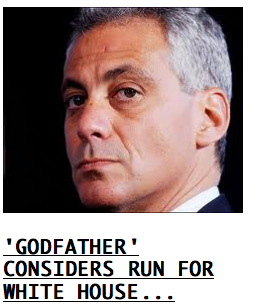|
Question of the day
Tuesday, Feb 19, 2013 - Posted by Rich Miller * Comptroller Topinka, Attorney General Madigan and Lt. Governor Sheila Simon at a weekend Chinese New Year celebration…  * The Question: Caption?
|
|
Bipartisan, labor-backed pension bill introduced
Tuesday, Feb 19, 2013 - Posted by Rich Miller * This Illinois Federation of Teachers e-mail from IFT President Dan Montgomery is being forwarded around all over the place…
The bill is here. Notice that there’s no explicit mention of a tax hike in this proposal. There’s just a requirement that all the money be paid. So, without other reforms, there would absolutely have to be either a big tax increase or more budget cuts, or both. Then again, it’s the first time that organized labor has actually supported a bill on this topic. It’s something. Discuss.
|
|
Today’s quote
Tuesday, Feb 19, 2013 - Posted by Rich Miller * Treasurer Dan Rutherford spoke at his hometown’s Lincoln Day dinner last night…
|
|
The Daily Bust
Tuesday, Feb 19, 2013 - Posted by Rich Miller * So, I saw this headline on Drudge while I was out of town over the weekend…  I smirked, then clicked on the link to what turned out to be a Daily Beast story. The lede…
Then I read way down into the story to see just who was saying such things…
Um, OK. Two guys say they heard some scuttlebutt at the inauguration. * The Sun-Times took it seriously…
* Meanwhile, the Daily Beast also interviewed Roland Burris. The article’s description of the man…
Understated? What? * Among other things, Burris told the Daily Beast about the downsides to his US Senate service…
* But he’s ready to go back…
I’m sure he would.
|
|
*** LIVE *** SESSION COVERAGE
Tuesday, Feb 19, 2013 - Posted by Rich Miller * The House doesn’t convene until 4 o’clock today, but we might as well get an early start. Blackberry users click here…
|
|
Poll: 72 percent of Illinoisans want stricter gun sale laws
Tuesday, Feb 19, 2013 - Posted by Rich Miller * The latest results from the Paul Simon Public Policy Institute’s statewide poll of 600 registered voters…
* From the Institute…
Subscribers have the complete crosstabs. Take a deep breath before commenting, please.
|
|
An inauspicious beginning
Tuesday, Feb 19, 2013 - Posted by Rich Miller * My weekly syndicated newspaper column…
* Related…
|
|
Not true
Tuesday, Feb 19, 2013 - Posted by Rich Miller * From Fox 32…
I never reported any such thing. I simply posted an analysis by a Toi Hutchinson partisan which made the claim that Hutchinson had won the week and also included the unsubstantiated allegations. In retrospect, I should’ve deleted that part of it. Kelly’s campaign flatly denied the allegation, by the way. Leave me out of this, please. * Related…
|
|
Protected: SUBSCRIBERS ONLY - Crosstabs
Tuesday, Feb 19, 2013 - Posted by Rich Miller
|
|
Protected: SUBSCRIBERS ONLY - Today’s edition of Capitol Fax (use all CAPS in password)
Tuesday, Feb 19, 2013 - Posted by Rich Miller
|
| « NEWER POSTS | PREVIOUS POSTS » |


















